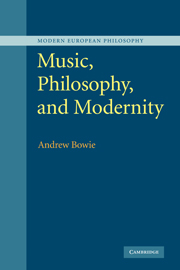Book contents
- Frontmatter
- Contents
- Preface
- Introduction
- 1 Form, feeling, metaphysics, and music
- 2 Music, language, and the origins of modernity
- 3 Rhythm and Romanticism
- 4 Hegel, philosophy and music
- 5 Music and the subjects of Romanticism
- 6 Music, freedom, and the critique of metaphysics
- 7 Pro and contra Wagner
- 8 Music, language, and being: Wittgenstein and Heidegger
- 9 Adorno: musical philosophy or philosophical music?
- Conclusion
- References
- Index
Conclusion
Published online by Cambridge University Press: 15 October 2009
- Frontmatter
- Contents
- Preface
- Introduction
- 1 Form, feeling, metaphysics, and music
- 2 Music, language, and the origins of modernity
- 3 Rhythm and Romanticism
- 4 Hegel, philosophy and music
- 5 Music and the subjects of Romanticism
- 6 Music, freedom, and the critique of metaphysics
- 7 Pro and contra Wagner
- 8 Music, language, and being: Wittgenstein and Heidegger
- 9 Adorno: musical philosophy or philosophical music?
- Conclusion
- References
- Index
Summary
Cheesecake, or metaphysics?
After Adorno's sombre analyses of the place of music in modernity, in which pleasure is often subordinated to truth, there might seem to be something refreshing about the bluff hedonism of Steven Pinker's claims that music is ‘auditory cheesecake’ (Pinker 1997: 534) and that ‘the direct effect of music is sheer, pointless pleasure’ (www.lse.ac.uk/collections/evolutionist/pinker.htm). The difference between Pinker and Adorno is a somewhat drastic illustration of how the split between metaphysics and metaphysics can manifest itself in modernity. In a riposte to the comical reductionism of evolutionary psychology's treatment of cultural issues, Louis Menand suggests against Pinker that:
Music appreciation, for instance, seems to be wired in at about the level of ‘Hot Cross Buns.’ But people learn to enjoy Wagner. They even learn to sing Wagner. One suspects that enjoying Wagner, singing Wagner, anything to do with Wagner, is in gross excess of the requirements of natural selection. To say that music is the product of a gene for ‘artmaking,’ naturally selected to impress potential mates – which is one of the things Pinker believes – is to say absolutely nothing about what makes any particular piece of music significant to human beings. No doubt Wagner wished to impress potential mates; who does not? It is a long way from there to ‘Parsifal’.
(www.newyorker.com/critics/books/?021125crbo_books. See also Simon Blackburn: www.phil.cam.ac.uk/∼swb24/reviews/Pinker.htm.)Pinker is not worth taking seriously in this context (and in quite a few others): he too often fails to separate how an aspect of culture may have originated from how it subsequently becomes significant.
- Type
- Chapter
- Information
- Music, Philosophy, and Modernity , pp. 376 - 417Publisher: Cambridge University PressPrint publication year: 2007

